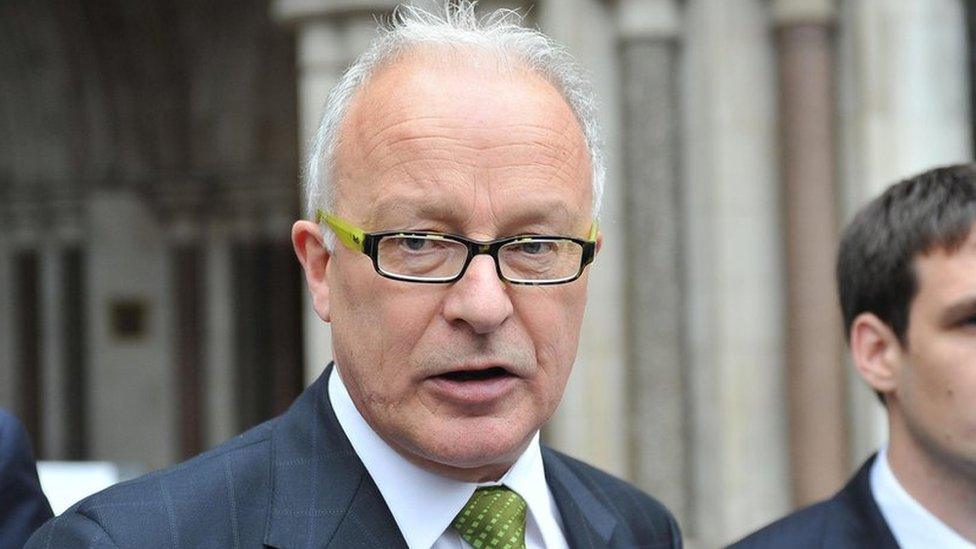Iraq lawyer Phil Shiner struck off over misconduct
- Published

A human rights lawyer who brought abuse claims against UK troops after the Iraq War has been struck off for misconduct.
Phil Shiner, from the now-defunct law firm Public Interest Lawyers, had 12 charges of misconduct proved against him by a panel of the Solicitors Disciplinary Tribunal.
He had admitted acting recklessly by publicly claiming UK troops unlawfully killed, tortured and mistreated Iraqis.
The defence secretary said Mr Shiner had "made soldiers' lives a misery".
Sir Michael Fallon told the BBC he was "delighted" that Mr Shiner had been "exposed".
"The decent thing for him to do now would be to apologise," he said.
Fallon: Struck-off lawyer Shiner should apologise
In five of the charges found proved he was found to have acted dishonestly, including agreeing to pay "sweeteners" to a fixer - named only as "Z" in tribunal papers but understood to be called Mazin Younis - to persuade him to change his evidence to the £31m Al-Sweady Inquiry.
The five-year investigation ruled in 2014 that allegations of murder and torture made against British soldiers by Iraqi detainees were "deliberate lies".
Mr Shiner previously admitted nine allegations of acting without integrity, including that he had made unsolicited approaches to potential clients.
Colonel James Coote, who was a major based in Basra, said the accusations brought by Mr Shiner would inevitably have left emotional scars.
"We can't turn the clock back," he said. "Nothing will undo the decade or so that my soldiers, their families and indeed my family have been through," he said.
"Personally speaking it has been difficult, but I feel now that a chapter is certainly behind us - clearly there is still one chapter open which we will not comment on now - but I think certainly it has been a very harrowing experience."
'State of avoidance'
Mr Shiner did not attend the hearing, having written to the tribunal to say he was unwell and could not afford to pay for a defence lawyer.
The tribunal heard in December that he accepted he would be struck off as a result of the case, thought to be one of the most expensive ever brought by the Solicitors Regulation Authority (SRA).

Andrew Tabachnik, representing the SRA, accused Mr Shiner of being "in a state of avoidance" to prevent proceedings from going ahead in full.
The hearing finished earlier than expected as a result of Mr Shiner's absence.
As a team leader at PIL, Mr Shiner authorised and procured payments and fee-sharing agreements with the agent, "Z", between 2007 and 2010.
The tribunal also ordered Mr Shiner to pay interim costs of £250,000.
A second solicitor from PIL, John Dickinson, was reprimanded by the tribunal and ordered to pay £2,000 costs after he admitted that he failed to keep Al-Sweady clients properly informed about the progress of the inquiry.
Ex head of Army tells World at One that the discredited lawyer Phil Shiner "caused a great deal of pain"
SRA chief executive Paul Philip said he welcomed the tribunal's decision to strike off Mr Shiner.
"It is important that solicitors can bring forward difficult cases, but the public must be able to place their trust in them," he said.
"His misconduct has caused real distress to soldiers, their families and to the families of Iraqi people who thought that their loved ones had been murdered or tortured.
"More than £30m of public funds were spent on investigating what proved to be false and dishonest allegations."
The tribunal aims to publish its decision within seven weeks, after which Mr Shiner would have 21 days to appeal.
The Iraq Historic Allegations Team will review cases brought by Mr Shiner and a make a decision over which should no longer be pursued.
Sir Michael said in a statement: "Justice has finally been served after we took the unprecedented step of submitting evidence on his abuse of our legal system.
"Phil Shiner made soldiers' lives a misery by pursuing false claims of torture and murder - now he should apologise.
"We will study any implications for outstanding legal claims closely."
- Published8 December 2016

- Published17 December 2014
